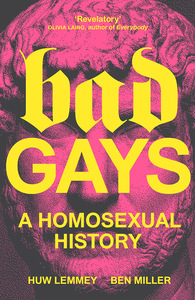Take a photo of a barcode or cover
informative
medium-paced
funny
informative
slow-paced
hopeful
informative
reflective
medium-paced
informative
reflective
medium-paced
dark
informative
medium-paced
I appreciated the point that was driven home in this book that activism that is not intersectional is 'bad'. All too often we see activist movements relying on privilege in certain areas to extend a more hospitable treatment towards gays who also share that privilege. This book highlights a number of these mostly wealthy, cis, white men.
This book includes a lot of history to give context for each featured 'bad gay'. While writing about historical events can tend to get dry and academic, the authors did a good job keeping it entertaining, and sharing tidbits about homosexual history that we don't often hear about.
The one criticism I have is for the few non white or non male figures thrown in- because there were so few, it almost felt like an obligatory 'diversity' addition. I understood their focus mainly on western culture and white men, because that is at the root of the specific 'bad gay' they were highlighting. Margaret mead was also in line with this privileged point of view, making her less out of place than the inclusion of Yukio Mishima. His story was incredibly compelling, and I loved hearing a bit about Japan and it's history with homosexuality, but because there weren't any other cultures also represented, it felt out of place.
This book includes a lot of history to give context for each featured 'bad gay'. While writing about historical events can tend to get dry and academic, the authors did a good job keeping it entertaining, and sharing tidbits about homosexual history that we don't often hear about.
The one criticism I have is for the few non white or non male figures thrown in- because there were so few, it almost felt like an obligatory 'diversity' addition. I understood their focus mainly on western culture and white men, because that is at the root of the specific 'bad gay' they were highlighting. Margaret mead was also in line with this privileged point of view, making her less out of place than the inclusion of Yukio Mishima. His story was incredibly compelling, and I loved hearing a bit about Japan and it's history with homosexuality, but because there weren't any other cultures also represented, it felt out of place.
An interesting lay persons history book of sometimes complicated, and sometimes actually evil, queer folk. The authors view of "bad" is really that these people were queer but that their queerness did not make them archetypical heroes. It's interesting, mostly well written, and informative, with a well stated slant that at least for my part, I agree with. Will this matter to anyone not interested in the topic? Maybe. As a piece of history writing, though, it is complicated by the attempted use of street vernacular in places, maybe to spice it up, or to make it less dull, but what these little interjections do is really distract from the history. History does not have to be dull, and it also doesn't need discussions of "fucking" to spice it up, as one could easily say the same thing in a way that's less jarring and fits with the accompanying paragraph. The question of "Did this person have sex with members of the same sex?" can easily be answered without jarring the reader. Lest one think this is prudishness, it's not, I'm fine with street language, when it's well integrated into the rest of the text.
All this being said, if you have an interest in history, or queerness (or LGBTQAI*) or their intersection, you should probably read this book.
All this being said, if you have an interest in history, or queerness (or LGBTQAI*) or their intersection, you should probably read this book.
Definitely a pop nonfiction; well-researched (just look at the long works cited list), but designed to be accessible. Also entertaining as all get-out.
funny
informative
reflective
sad
medium-paced




